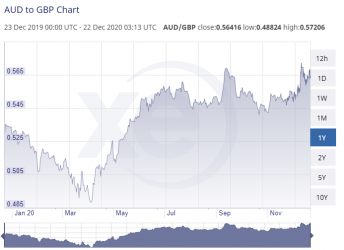I've long given up on trying to understand the real impact of new "unconventional" monetary policy tools of QE and negative rates, but here's the quote from Lowe:
“When the pandemic was at its worst and there were severe restrictions on activity, we judged that there was little to be gained from further monetary easing,” he said.
“As the economy opens up, though, it is reasonable to expect that further monetary easing would get more traction than was the case earlier.”
When short term interest rates go below the rate of inflation, without fail, they cease to increase economic activity & instead achieve the opposite result. That failed policy rewards profligate borrowers/gamblers and penalises responsible companies/people. Savings become a losing proposition (especially as interest is taxed) with the cost of living rising by a multiple of your after-tax income.
So people who have saved up to live off later - now find they have to cut back. Consider the 8% available in Australia to savers back in the early 2000s - today the general savings interest rate is around 1/10 (if extremely active in pursuing introductory offers) to 1/40th if not. Expected annual spending in retirement from interest income has dropped a minimum of 90% meanwhile shinky operators & developers etc can leverage up to pay themselves massive amounts, declare the company bankrupt when their latest Ponzi scheme fails - and move on to the next one.
Central Banks around the world have been shown up. Their use-by date has come & gone.
The Bank of Japan is fast approaching the end of its 3rd decade of zero interest rates.
The result, an economy that is un-officially bankrupt. Virtually zero real growth in 20 years & now has so much Central Govt debt (alone) that Japanese interest rates can never rise as if they went up by 2.00% it would require the interest bill would equate to the total Federal Govt spending currently.
Residential property prices in Japan are still around 70% below their peaks & all Japanese banks are insolvent but due to the global implications - the IMF & World Bank agreed to look the other way since 1994. Back then Japan was the world's second largest economy.
So the rest of the Central Bank community saw how good a result the zero interest rates achieved - and still did the same. I suppose when there's nothing else you know how to do then Central Banks (like the RBA) rely on the spin doctors to justify their existence & salaries.
When the interest rate (cost of money) for 10 Yr German Govt bonds is below zero, way below actually at - 0.59% = things are really bad.
After all, people are happy to give their money to the German Govt for ten years and only get back $94 at the end whilst the cost of living keeps rising.
Within a couple of years of the BoJ Zero Interest Rate Policy (ZIRP) being underway - a very well respected strategist summed it up as effective as pushing on a piece of string to move a B747.















